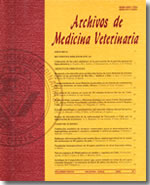Use of allogenic fascia lata in perineal herniorrhaphy in dogs: communication of 7 clinical cases
Main Article Content
Abstract
The aim of this study was to describe and evaluate the treatment of perineal herniorrhaphy in dogs using allogeneic fascia lata. For this purpose, fascia lata was obtained from dog weighing 15 kg or more, whose death cause did not involve infectious or oncologic conditions, nor collagen- disease or trauma, or surgical scars to the thighs. The fascia lata was preserved in 75% glycerin solution. Seven patients with unilateral perineal hernia were selected for this clinical trial. Using a perineal approach, the hernia was reduced, muscles repositioned, and reconstruction was achieved suturing the fascia lata with interrupted 0 Nylon monofilament suture. Evaluations were made at 7, 15, 30 and 60 days, to assess the following parameters: defecation, micturition, local inflammation, and pain. The allogeneic graft was not rejected, and the herniorrhaphy technique was successful in all cases. No post-surgical complications were observed at 60 days after, while defecation, micturition and regional anatomy returned to normality. Allogeneic processed fascia lata has herein demonstrated to be biocompatible and well tolerated, thus allowing to be considered a safe and useful option to perineal herniorrhaphy technique in dogs.

